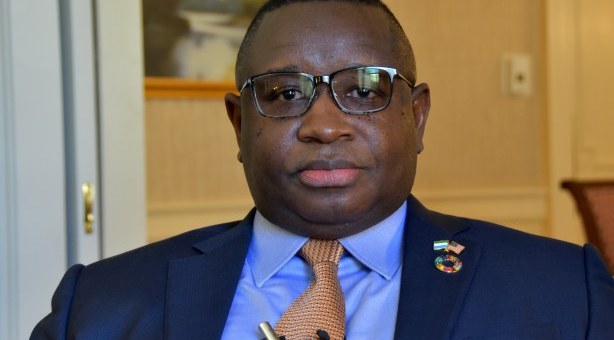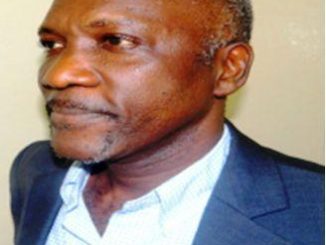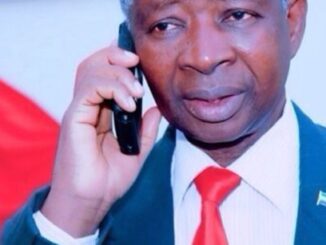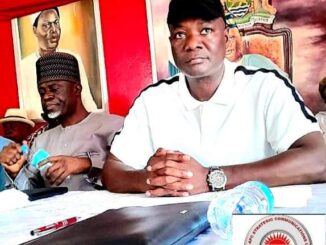
By Chernoh Alpha M. Bah, Matthew Anderson, and Mark Feldman
The government of Sierra Leone has stopped an ongoing audit that looks into the use of the coronavirus emergency funds by the country’s National Coronavirus Emergency Response Center (NaCOVERC). Cabinet minutes and a letter from the country’s Law Officers Department, seen by the Africanist Press, articulates the government’s unwillingness to respond to management inquiries into use of coronavirus funds by the leadership of NaCOVERC.

Details of official correspondences and minute papers seen by the Africanist Press point to a seeming administrative standoff between officials of Julius Maada Bio’s government and the leadership of the Audit Service Sierra Leone, the country’s constitutionally mandated auditing agency.
Section 11 of the Audit Service Act of 2014 empowers the Sierra Leone Audit Service “to audit and report on all public accounts of Sierra Leone and all public offices including the judiciary, the central and local government institutions, universities, public sector institutions, statutory corporations, companies, and other bodies and organizations established by an Act of Parliament or statutory instrument or otherwise set up wholly or in part out of public funds.” Section 11 (2c) of the 2014 Audit Service Act specifically mandates the Audit Service to undertake specialized audits into any government entity or institution to “ensure that efficiency and effectiveness are achieved in the use of public funds.”

The recent administrative tension and standoff between the Audit Service and government officials over audit performances casts deep suspicion on the Bio administration’s claim to fiscal discipline and points to an ongoing effort to cover-up existing evidence of graft and frivolous public expenditure already captured in the draft audit report on coronavirus funds.
However, officials in the Bio administration have blocked the ongoing audit on use of emergency funds allocated in response to the coronavirus pandemic in Sierra Leone, citing state of emergency regulations as the legal basis for their refusal to cooperate with the country’s auditing agency. A letter dispatched on October 22, 2020 from the country’s law officers’ department, and signed by Sierra Leone’s Attorney General and Justice Minister, has argued that auditing of the country’s coronavirus emergency funds have to be put on hold until the end of the state of emergency declared in response to the coronavirus pandemic by the president.
Justice Minister, Anthony Brewah, says both the National Coronavirus Emergency Response Center and the Disease Emergency Fund Oversight Committee were all established by Constitutional Instrument No21 of 2020, which included emergency regulations passed in response to the coronavirus outbreak by the president. The said regulations, he explained, gave the president extraordinary powers, through the state of emergency, to take extraordinary measures that appear to him necessary and expedient to prevent or control the coronavirus pandemic.
“Every order or rule made in pursuance of such a regulation shall have effect notwithstanding anything inconsistent therewith contained in any law,” Brewah argued, adding that, “any provision of a law which is inconsistent with any such regulation, order, or rule shall whether the provision has or have not been amended, nullified, or suspended in operation under any Act, cease to have effect to the extent that such regulation, order, or rule remains in force.”
Brewah emphasizes that provisions of the Constitutional Instrument No.21 of 2020 supersede any other provision of law that is inconsistent with any of the provisions of the said emergency regulations, including provisions contained in both the 2016 Public Finance Management Act and the Public Procurement Act of 2016. His statement also confirms that any other related laws shall not be effective if they are inconsistent with any provision of the Constitutional Instrument No.21 of 2020, the management regulations governing the Coronavirus Disease Emergency Fund.

Brewah, however, does not say how the auditing exercise into coronavirus funds are inconsistent with the emergency regulations he was citing. In an earlier letter dated September 22, 2020, the country’s auditor general, Lara Taylor-Pearce, had asked officials of the National Coronavirus Response Center to review and respond, within two weeks, in writing to findings and recommendations of a draft audit report on funds managed by the National Covid 19 Emergency Response Center.
In response to said letter, Brewah says the auditor general’s request wouldn’t be met because, according to him, “the assignment is nearly impossible to execute bearing in mind that we are within a period of State of Public Emergency as proclaimed by His excellency the President and endorsed by parliament.”
The Minister further states that officials in charge of the country’s coronavirus response center wouldn’t respond to any of the issues and questions raised in the draft audit report on use of funds allocated to the coronavirus pandemic response. Brewah said the national coronavirus response program itself is under the office of the president, who functions as the chairperson of the Coronavirus Emergency Fund Oversight Committee. According to Brewah, Section 6(3) of Constitutional Instrument No.21 of 2020, which governs the management of the coronavirus fund, only places the Administrator of the coronavirus funds under the special and general direction and control of the president.
“It is my considered opinion that the Administrator is only subject to the special and general directions of the President and not any other authority including the Office of the Auditor General. This is the legal opinion of the Fund until the end of the termination of the State of Public Emergency period when the administrator shall be obliged to submit his report to parliament,” he stated.

Although officials of the Bio administration argue that the coronavirus emergency regulations supersede any other existing law and precludes the Audit Service from performing its auditing functions on the use of the coronavirus emergency funds, Audit Service officials, on the other hand, are insisting that Section 11 (2c) of the Audit Service Act of 2014 mandates the Audit Service to undertake special “audits to ensure that efficiency and effectiveness are achieved in the use of public funds.” Audit officials argue that Section 65 (6) of the 2016 Public Financial Management Act also provides them with the authority to undertake the said exercise. They say the law provides that nothing “shall prevent the Auditor General from undertaking a special audit into the use of public funds and submitting a special report for tabling in parliament on matters that should not await disclosure in the annual report.″ They pointed out that the same rules applied when a special audit into the use of Ebola emergency funds was undertaken by the Audit Service in 2015 despite the existence of a similar state of public emergency.
The recent administrative tension and standoff between the Audit Service and government officials over audit performances casts deep suspicion on the Bio administration’s claim to fiscal discipline and points to an ongoing effort to cover-up existing evidence of graft and frivolous public expenditure already captured in the draft audit report on coronavirus funds. A senior audit official interviewed by the Africanist Press expressed grave concerns over this recent and ongoing effort to prevent independent auditing of public funds.

“There are already ongoing reports that government is pressurizing the audit service into delaying the release of both the 2019 annual report and the audit report on coronavirus funds,” he said, adding that, “revelations of a stand-off between cabinet officials and the auditor general regarding auditing of emergency funds will only lend credence to public suspicions that monies meant for the coronavirus response have been massively misappropriated and couldn’t be properly account for.”
Justice Minister Brewah refused to comment on the details of his October 22 letter addressed to the auditor general when contacted by Africanist Press. “I do not speak to the press,” he said. Africanist Press could also not get the response of the National Coronavirus Emergency Response Center (NaCOVERC) despite an email correspondence and phone calls to the Covid 19 spokesperson, Solomom Jamiru.
We publish with this article the Attorney General’s letter of October 22, 2020 addressed to the Auditor General to demonstrate the evidence upon which this report is based.



